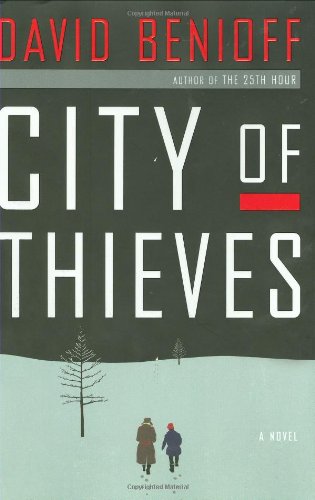All Nonfiction
- Bullying
- Books
- Academic
- Author Interviews
- Celebrity interviews
- College Articles
- College Essays
- Educator of the Year
- Heroes
- Interviews
- Memoir
- Personal Experience
- Sports
- Travel & Culture
All Opinions
- Bullying
- Current Events / Politics
- Discrimination
- Drugs / Alcohol / Smoking
- Entertainment / Celebrities
- Environment
- Love / Relationships
- Movies / Music / TV
- Pop Culture / Trends
- School / College
- Social Issues / Civics
- Spirituality / Religion
- Sports / Hobbies
All Hot Topics
- Bullying
- Community Service
- Environment
- Health
- Letters to the Editor
- Pride & Prejudice
- What Matters
- Back
Summer Guide
- Program Links
- Program Reviews
- Back
College Guide
- College Links
- College Reviews
- College Essays
- College Articles
- Back
City of Thieves by David Benioff
The stories of the holocaust are gruesome. From books like Night by Elie Wiesel and The Diary of Anne Frank, the horrors of the time are shown to us with great detail. What people seem to forget from this is that there were millions of other people, many times people not in Germany, who endured hardships similar and yet incredibly different from the countless Jews put up to slaughter. In City of Thieves, the story follows a teen-aged Jew in Piter (or Leningrad) during the invasion of Russia by the Germans. This protagonist’s struggles come not from anti-Semitism but from starvation and attack. His family has escaped the city, but he is left there to defend Piter and to survive on ration cards.
One day a dead German falls from the sky out of a plane. He and his friends go to rob his body of any useful tools or supplies. But when the others escape, our protagonist falls into the hands of the Russian “police” of Piter. He knows that many don’t survive going to prison, but he is given an ultimatum along with his prison mate, to find twelve eggs by the next Thursday in order to not be executed. It’s for the wedding cake of the police chief’s daughter, but both our protagonist and his prison mate know that there aren’t any eggs left in Piter.
So they set out on an adventure past German lines, into a group of “partisan” assassins, and through the cold winter of Russia. Food is even scarcer in the wild, and atrocities of the war are everywhere, endless and infinite.
The protagonist and his prison mate become friends, and along the way the banter between them is somehow comical in the midst of the war’s horror. The author manages to make both the comedy and war realistic, all the while maintaining a somber tone. While the book is fiction, a lot of what it mentions, cannibalism, anti-tank dogs, and prostitution, is very real. Even though the journey for twelve eggs seems ridiculous, the characters see the eggs as their savior, and they get involved with a much larger scheme along the way.
Finally, this is truly a coming-of-age story, perhaps of both the protagonist and his prison mate. The prison mate comes to terms with his writing and surreptitious timidity, while the protagonist learns what true evil and horror is. Despite all of what is disturbing about the book, it manages to end on a happier note, one that will leave with the feeling that even though there is evil in the world, there will always be good too.
Similar Articles
JOIN THE DISCUSSION
This article has 0 comments.

